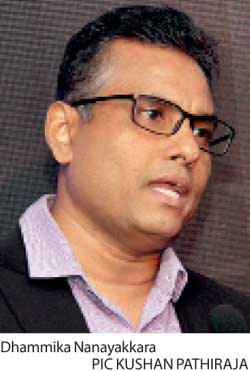16 Mar 2018 - {{hitsCtrl.values.hits}}
 By Yohan Perera
By Yohan Perera
LTL Holdings, which claimed to have submitted the lowest bid of US $ 160 million for the construction of 300MW liquefied natural gas (LNG) power plant in Kerawalapitiya, this week urged the authorities to think of the national interest when going ahead with the tender procedures.
The company therefore called for depoliticisation of the tender procedures.
“We always quote the lowest or the second lowest when bidding for the construction of power plants,” LTL Chief Operating Officer Dhammika Nanayakkara told a ceremony held on Wednesday to mark the 35th anniversary of LTL.
“We have been able to surpass the proposals made by a Japanese company and another company from China. Some, including one intellectual, who claimed to be an expert, had stated that a complex cycle power station cannot be operated using oil fire.
However, as of now, we have been able to save Rs.50 billion for the country using this technology,” he said.
He added that the company has the technology to change into LNG, if the need arises.
“We have the capability of assisting the government to save more funds through avoiding emergency power purchases, which is a costly affair,” he also said.
However, the company welcomed the offshore LNG import facility, which the government is planning to set with Japanese and Indian assistance.
LTL Holdings was established in 1980 by two young engineers—Channa Amerasinghe and U.D. Jayawardena—who were at the time working at the transformer repair unit of the Ceylon Electricity Board (CEB).
At the time, only about 10 percent of Sri Lankan population had electricity, largely due to the substandard transformers, which were imported to the country.
Amerasinghe and Jayawardena, with the help of the CEB and several other young engineers, were able to open a factory to make transformers locally and supply them to the CEB, to replace the defective transformers, which required frequent maintenance; they were bought by the electricity utility through tenders.
The CEB buys LTL transformers and galvanising services at a formula-based price, without calling for tenders. As a result, Sri Lanka became the first country in South Asia to have maintenance-free transformers by the early 90s.
However, the major turning point for the company was the decision it made to enter the power generation business in mid-90s.
In 1996, the government made a decision to invite private investors to enter the power and energy industry, which enabled LTL to expand its operations and invest its expertise towards the development of power stations. This marked the origin of a new company subsidiary called Lakdhanavi (Pvt.) Ltd.
The inception of Lakdhanavi marked a crucial juncture in the Sri Lankan power industry. The first power station in Sri Lanka was established in 1895 by a British-owned company. Thereafter, all power stations in Sri Lanka were established by foreign companies. Lakdhanavi was the first locally-owned power station to be established in the country after 100 years.
LTL entered the power generation industry by establishing Belihuloya Power Station, which was capable of producing 2.2 MW of power. The company made further advances forward by establishing Sapugaskanda Lakdhanavi Power Station, which was capable of producing 25 MW of power.
As of now, Lakdhanavi is considered to be the largest independent power producer in Sri Lanka.
LTL said that other than the capital investment of Rs.105 million made by the CEB in 1996, the state power utility has never made any investment in LTL.
But the total value of the dividends paid by LTL, based on the CEB’s capital investment, exceeds Rs.13 billion and the value of the assets developed on the initial investment exceeds Rs.12 billion.
According to the price formula developed by the CEB, LTL earns a total amount of Rs.200 million by producing transformers for the CEB.
According to LTL, this amounts to only a 7 percent of the company’s income and 5 percent of the profit. The remaining 95 percent of profit and 93 percent of income is earned through foreign and local projects that the company has undertaken after tender processes.
As an overall percentage, LTL earns only 15 percent of its profits through the transactions conducted with the CEB. The remaining 85 percent is earned through local and foreign projects carried out after competitive tender procedures.
LTL has built power plants in Bangladesh, Oman and the Maldives and was involved in power transmission projects in countries like Uganda, Tanzania and Kenya. LTL said these foreign ventures earned over Rs.24 billion in foreign exchange to the country.
As of today, after fulfilling the local requirement, LTL exports 60 percent of its transformers for utilization in foreign countries. The company said as a brand name, the reputation of LTL Holdings is only second to Ceylon Tea in the Asian and African countries.
LTL has currently undertaken the construction of six more power plants in Bangladesh. The current value of LTL Holdings, according to the company officials, is Rs.18 billion.
19 Nov 2024 23 minute ago
19 Nov 2024 3 hours ago
18 Nov 2024 18 Nov 2024
18 Nov 2024 18 Nov 2024
18 Nov 2024 18 Nov 2024